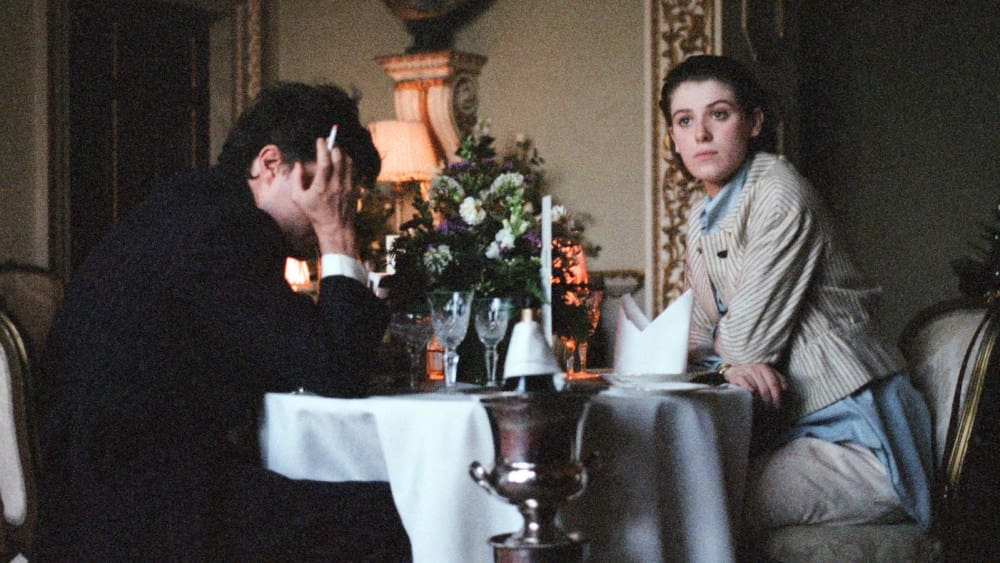
It takes a while to figure out why watching The Souvenir feels so uncomfortable. The movie is somewhat slow, taking its time to set up its story and introduce its characters. There are minor conflicts, but you can’t really see where the story is heading. All you know is that young lovers Julie (Honor Swinton Byrne) and Anthony (Tom Burke) have a somewhat heated relationship—they have chemistry, but there is an underlying tension, and their domestic scenes rotate between lightly boring and weirdly authentic.
But at some point in the first half of the film, Julie, a film student, discusses the act of telling personal stories through film, and whether a filmmaker has an obligation to do so. And then it clicks: this is a cinematic memoir, and we’re watching a recreation of director Joanna Hogg’s former romantic relationship. More than that: we’re watching her process the relationship’s demise through art. And once that becomes clear, the film becomes quietly brilliant and consistently compelling.
We’re given just the bare-bone details of Julie and Anthony’s relationship, and learn almost nothing about their lives before meeting, but we don’t need anymore than Hogg gives us. Byrne and Burke are so good at creating their characters’ interior lives, and they feel so fully fleshed out—especially as more details about their lives are revealed to each other. Anthony is an untrustworthy man who is poorly hiding a major secret that audiences may figure out quickly, but should be unspoiled nonetheless. He plays the part so well, never bothering to win the audience over and reveling in the character’s flaws. Byrne, meanwhile, clues the audience in to what her character is thinking without ever spelling it out. One brilliant scene finds her wordlessly comprehending a shocking revelation about her boyfriend and that extended shot alone announces her as a major talent.
A common complaint about the film is that viewers don’t understand why Julie would stay with Anthony, a character who is not exactly likable. It’s a fair question, as the character is frequently quite frustrating. But I think Hogg is similarly unsure of that answer, and is trying to explore the possible answers through film. We see little bits into Julie’s home life, and her mom’s passive relationship with her more hot-headed dad, in a brilliant scene that subtly explores gender dynamics in heterosexual relationships and the way they inadvertently impact our choices in romantic partners. Hogg also studies the way Julie interacts with her friends, classmates, and other people around her, never making excuses or apologizing for her actions, but genuinely trying to understand them. It’s really stunning work, and helps sell the main relationship: we’ll never quite know why Julie stays with Anthony, but no one will, and we can take comfort in the universal mysteries of our romantic choices.
The film’s third act is by far its most conventional, and while it somewhat loses the introspective quality that made the first two acts stand out, it is still terrific filmmaking and well acted drama. While avoiding spoilers, the film becomes a gutting exploration of a relationship imploding, and showcases two very strong performances.
Even better, Byrne’s real-life mother Tilda Swinton plays her onscreen mom as well, and delivers two absolutely stunning moments of acting that should honestly thrust her into the Oscar conversation. In one, she delivers quite a bit of dialogue in monotone, but communicates so much pain and confusion in slight facial ticks. In another, she delivers a gut-punch of a one liner. It’s great work from a great performer.
This is not Hogg’s first film, but it is her biggest – another terrific perk of A24, who continue to show how committed they are in giving independent voices major platforms. It’s fascinating to learn that Hogg is planning a sequel to the film—especially since the story itself is completely wrapped up by the time the credits roll. But there’s something so powerful about watching a director process their trauma through film, while still opening the doors for viewers to connect with the characters through their own relationships. I’m excited to see whatever she wants to do next, and I hope other directors follow suit. More cinematic memoirs, please!

